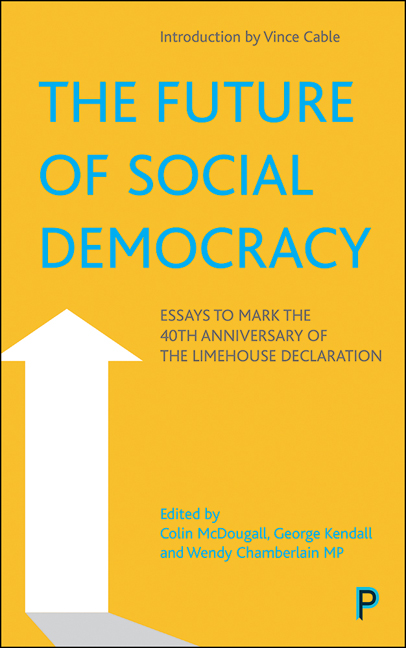Book contents
- Frontmatter
- Dedication
- Contents
- Notes on the authors
- Foreword
- Introduction: what are the priorities for social democrats?
- One After the failed alternative vote referendum, how can electoral reform have a future?
- Two How could a government actually deliver more housing?
- Three How will technology change the future of work?
- Four Can better public ownership promote efficiency and social justice?
- Five How do we grow the economy without damaging the environment?
- Six How can global free trade work for everyone?
- Seven Towards a social democratic foreign policy?
- Eight How do we deliver social justice through education?
- Nine What is the Social Democrat Group?
- Index
One - After the failed alternative vote referendum, how can electoral reform have a future?
Published online by Cambridge University Press: 05 January 2022
- Frontmatter
- Dedication
- Contents
- Notes on the authors
- Foreword
- Introduction: what are the priorities for social democrats?
- One After the failed alternative vote referendum, how can electoral reform have a future?
- Two How could a government actually deliver more housing?
- Three How will technology change the future of work?
- Four Can better public ownership promote efficiency and social justice?
- Five How do we grow the economy without damaging the environment?
- Six How can global free trade work for everyone?
- Seven Towards a social democratic foreign policy?
- Eight How do we deliver social justice through education?
- Nine What is the Social Democrat Group?
- Index
Summary
The Liberal Democrats have been arguing for electoral reform for many years, largely focused on replacing the first-past-the post voting system for Westminster. During that time, despite progress in delivering more proportional systems for both the Welsh Senedd and the Scottish Parliament, the party and others have failed to make a compelling case for change.
Since the alternative vote (AV) referendum during the Coalition period, two further referendums have taken place: on Scottish Independence in 2014 and on leaving the EU in 2016. Putting to one side the position that AV is not in itself a proportional system, the outcomes of the following two referendums in the UK have made the case for electoral reform more pressing.
The politics of place, a key argument in support of first past the post, continues to persist. In an era of increasing identity politics, place has increasing importance to many. With COVID-19, however, the straining of centralised decision-making at Westminster, and better recognition of the powers held by the devolved administrations in Scotland, Wales and Northern Ireland, could mean electoral reform's time has come.
The outcome of the December 2019 general election delivered an 80-seat majority to Boris Johnson's government on less than 44 per cent of the vote, as well as a dominant Scottish National Party (SNP) in Scotland (where the disparity was even more stark, with the SNP gaining 80 per cent of the seats on only 45 per cent of the popular vote). The Brexit Party's biggest impact on the election was its decision to stand down in Conservative-held seats, effectively denying its supporters the opportunity to vote in support of them. The Liberal Democrats’ own share of the vote increased by over 4 per cent but there was a decrease in seats to the current 11. These factors are leading to an increasing realisation within the Labour Party that it will be unable to return to government without the assistance of, and support for, a more proportional electoral system.
It is easy to forget that first past the post is not the default system in place across the UK. It ironically persists in England, where the vote to leave the EU has often been characterised as a vote by the left behind. Perhaps the perception of wasted votes making no difference in their local areas also had a part to play.
- Type
- Chapter
- Information
- The Future of Social DemocracyEssays to Mark the 40th Anniversary of the Limehouse Declaration, pp. 13 - 22Publisher: Bristol University PressPrint publication year: 2021



